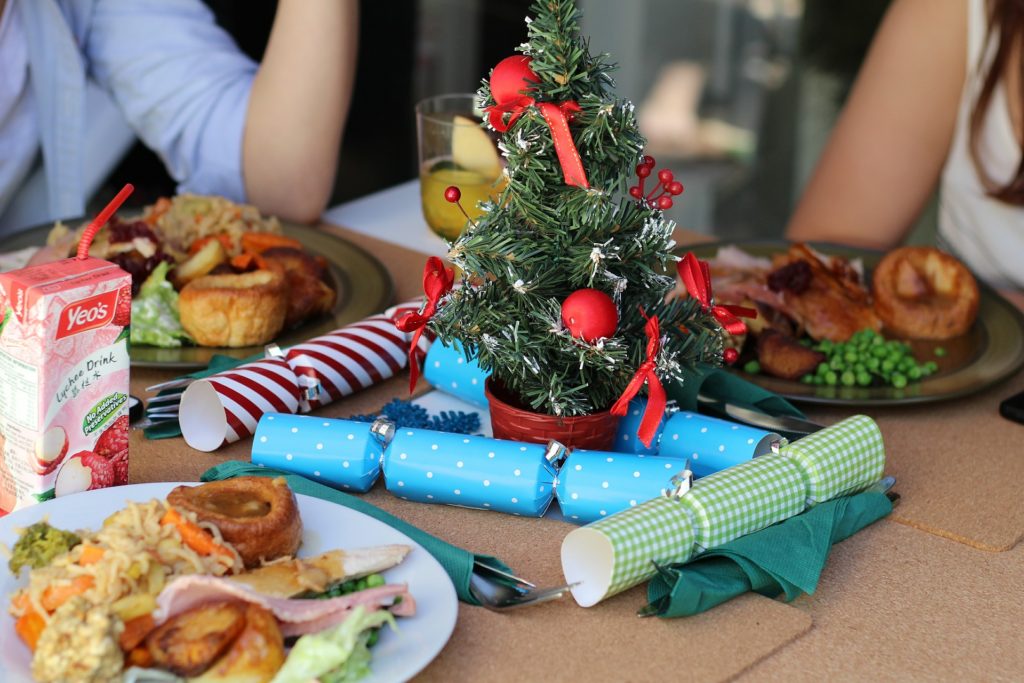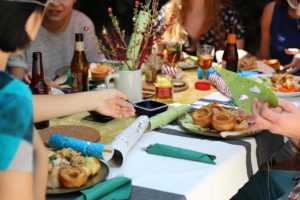- Calls to this hotline are currently being directed to Within Health, Fay or Eating Disorder Solutions
- Representatives are standing by 24/7 to help answer your questions
- All calls are confidential and HIPAA compliant
- There is no obligation or cost to call
- Eating Disorder Hope does not receive any commissions or fees dependent upon which provider you select
- Additional treatment providers are located on our directory or samhsa.gov
Get Through Holiday Parties Without Restricting or Bingeing

Holiday celebrations and events typically mean an excess of food and treats that are usually found at this time of year.
Often many individuals struggling with an eating disorder may find it difficult to fight off urges to restrict or binge.
When working eating disorder recovery, learning to combat urges with coping skills and tools can be essential to not engaging in unhealthy behaviors.
Challenging the Voice Inside
Holiday celebrations can be an opportunity for individuals to challenge their eating disorder voice and urges.
It can give a person the chance to get outside their comfort zone, and practice skills worked on in treatment or group therapy to manage stress and triggers.
First, it is important to plan ahead if possible during the holidays [1]. If knowing when parties will be occurring and where it can help the sufferer prepare for any concerns or triggers, there may be.
It can also allow for individuals to practice role-playing in group therapy or support groups to practice prior to the events.
Being able to prepare for party conversations is another way to get through holiday parties without engaging in anorexia nervosa or binge eating behaviors.
It can be helpful to talk with your therapist, trusted co-worker, or family members about ways to change topics if they start to gear toward diets, weight loss, or new year resolutions.
Having a plan of action to know when and how to shift the topic or even leave the conversation can be helpful.
Keep Moving Forward
Work your meal plan throughout the holiday season. Remember that following your set meal plan is part of recovery and being able to not engage in restricting or bingeing behaviors helps you prepare for holiday parties.
 Knowing that you can incorporate your meal plan into the holidays is also vital. Working with your dietician on how to best prepare for holiday parties is also a part of being able to navigate them successfully.
Knowing that you can incorporate your meal plan into the holidays is also vital. Working with your dietician on how to best prepare for holiday parties is also a part of being able to navigate them successfully.
Keeping mindful of your environment. Practicing the simple act of breathing is so important to stay aware in each moment, especially at parties.
Working on taking in what is happening around you before acting in the moment.
Using your senses throughout the party and with the food is also helpful to be able to process what visually looks appetizing, what smells good to you, and if there are new foods you would like to try.
Being able to take a step back in these situations allows your body and brain to decide what you would like to do and not allow the eating disorder to dictate your actions.
Try to be aware of any impulsive eating during the holiday parties as well [2]. It can be almost habitual to reach for snack foods or want to overeat to manage the stress of conversations or situations at a party.
Following your daily routine is also a part of keeping the eating disorder at bay during the holidays. Being able to keep to your normal sleep, eating, and body movement routines can help you be your best mental, physical, and emotional self.
What is Reality?
Focusing on realistic expectations and obligations during the holiday is also key. Being able to weed out which things are necessary, which are things you would like to try to attend, and which are not something you need or want to do can help avoid triggering situations.
Engaging in situations that involve cognitive distortions such as ‘I must do this or attend this” can lead to feeling overwhelmed, stressed, and possibly relapsing into unhealthy behaviors.
Simplify as much as you can during the holiday season and chose situations that you feel you will enjoy.
Keeping your recovery first is also a must. This time of year can be triggering for many sufferers of an eating disorder. Working your recovery is vital.
Keeping your therapy appointments, attending support groups, or group therapy as needed, and being able to lean on your support system as needed are all ways to work your recovery plan.
Be mindful of what you are feeling during a holiday party and remember that you can always leave if things become too overwhelming.
Bringing a friend or supportive loved one can also help with managing holiday parties. You can work with your support person prior to the party to be able to help with triggers, meals or hors-d’oeuvres and triggering conversations.
You can talk out your feelings and concerns prior to the party and even after to assess how the event went.
Success Comes in All Sizes
Being able to work your recovery during the holiday season can be a bit more work, but it is worth the reward of being able to manage successfully.

Success during the holidays can come in many forms, but most importantly it is about feeling proud of yourself, your ability to handle a problematic office conversation, a family member who starts to talk about your weight or being able to try a new challenge food at a party.
It is about using your recovery coping skills or reaching out to your treatment team or support person to avoid a relapse. All of these are ways that we use our recovery plan and people to keep the holidays from becoming a relapse.
If you do relapse, do not feel that you have failed, but remember it is a learning tool for your recovery journey. It is about knowing what we can manage and not at various points along the way.
Holidays can be joyful, bittersweet, and simple. It is about focusing on what you enjoy going into the season. Working your recovery and leaning into loved ones can help keep your focus on your health and happiness.
 About the Author: Libby Lyons is a Licensed Clinical Social Worker and Certified Eating Disorder Specialist (CEDS). Libby has been practicing in the field of eating disorders, addictions, depression, anxiety and other comorbid issues in various agencies. Libby has previously worked as a contractor for the United States Air Force Domestic Violence Program, Saint Louis University Student Health and Counseling, Saint Louis Behavioral Medicine Institute Eating Disorders Program, and has been in Private Practice.
About the Author: Libby Lyons is a Licensed Clinical Social Worker and Certified Eating Disorder Specialist (CEDS). Libby has been practicing in the field of eating disorders, addictions, depression, anxiety and other comorbid issues in various agencies. Libby has previously worked as a contractor for the United States Air Force Domestic Violence Program, Saint Louis University Student Health and Counseling, Saint Louis Behavioral Medicine Institute Eating Disorders Program, and has been in Private Practice.
Libby currently works as a counselor at Fontbonne University and is a Adjunct Professor at Saint Louis University, and is a contributing author for Addiction Hope and Eating Disorder Hope. Libby lives in the St. Louis area with her husband and two daughters. She enjoys spending time with her family, running, and watching movies.
References:
[1] Flint, J. (2016, November 16). 8 Tips to Avoid Binge Eating This Thanksgiving. Retrieved October 29, 2017, from https://www.recoverywarriors.com/8-tips-to-avoid-a-binge-this-thanksgiving/[2] 12 Tips to Protect Your Binge Eating Disorder (BED) Recovery This Holiday Season. (n.d.). Retrieved October 30, 2017, from https://www.eatingrecoverycenter.com/blog/october-2017/12-tips-to-protect-your-binge-eating-disorder-(bed)-recovery-this-holiday-season
The opinions and views of our guest contributors are shared to provide a broad perspective of eating disorders. These are not necessarily the views of Eating Disorder Hope, but an effort to offer discussion of various issues by different concerned individuals.
We at Eating Disorder Hope understand that eating disorders result from a combination of environmental and genetic factors. If you or a loved one are suffering from an eating disorder, please know that there is hope for you, and seek immediate professional help.
Published on December 4, 2017.
Reviewed By: Jacquelyn Ekern, MS, LPC on December 4, 2017.
Published on EatingDisorderHope.com

The EatingDisorderHope.com editorial team comprises experienced writers, editors, and medical reviewers specializing in eating disorders, treatment, and mental and behavioral health.

